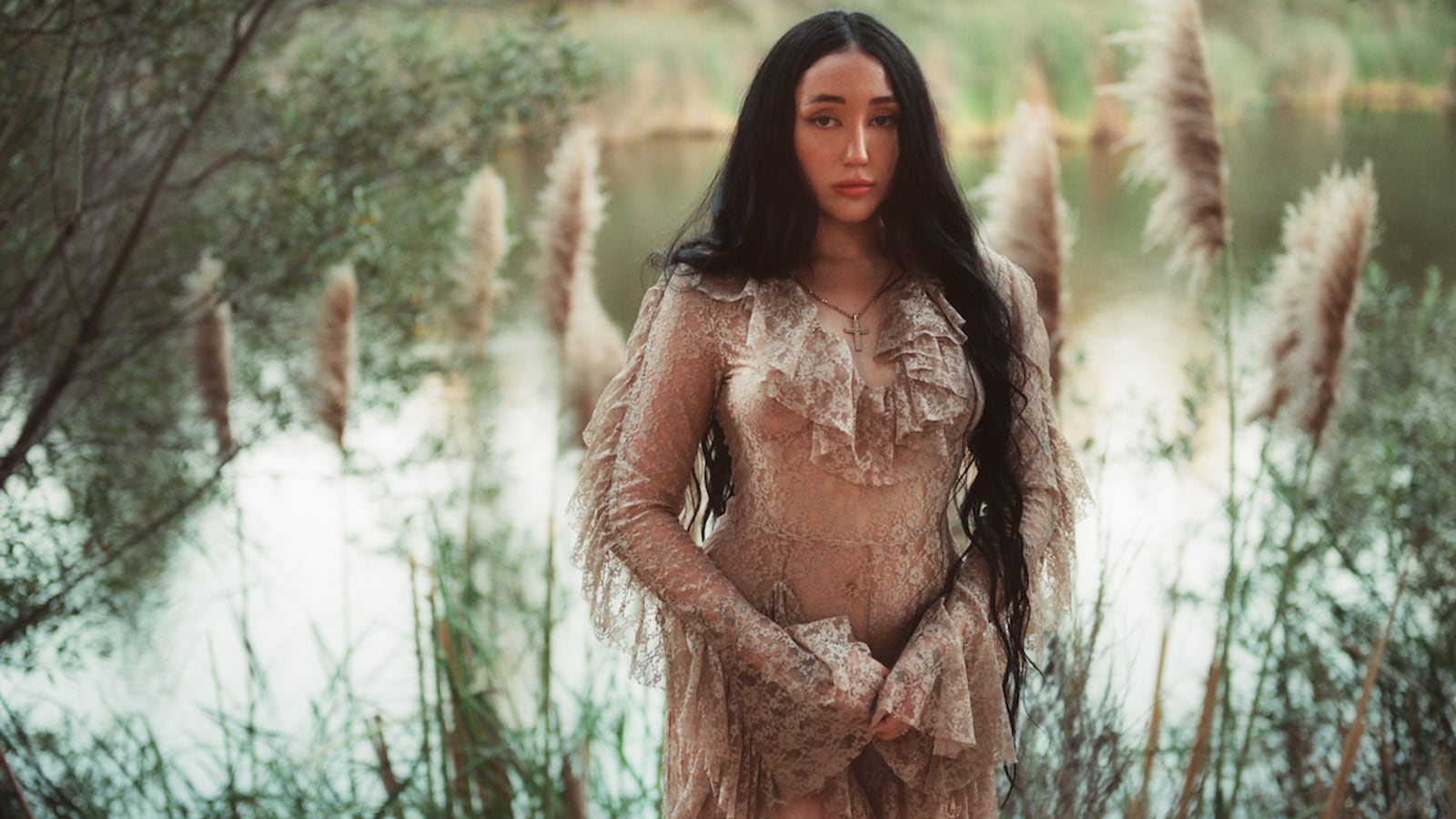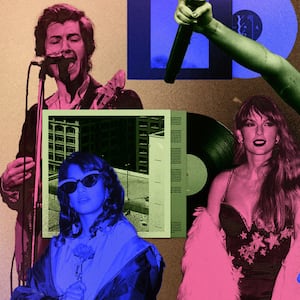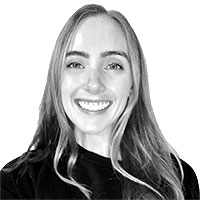At long last, Noah Cyrus is ready to officially introduce herself. Six years after she launched her music career with the single “Make Me (Cry),” the 22-year-old singer-songwriter’s debut studio album, The Hardest Part, arrived on Friday. When I point out to her on a recent Zoom call how unbelievable it is that she’s maintained a steady stream of music during the past six years without ever releasing a proper album, Cyrus agrees while attempting to explain: There were “inner conflicts with past teams,” she says, and then things got put on the back burner while she prioritized her “mental health and physical wellbeing” (more on that later).
More than anything, though, she began her career “extremely young” and needed time to figure herself out. Case in point: At one time, she was set to release an album called NC-17—a cheeky title that played on her initials, her age at the time, and, of course, the MPAA’s rating for explicit films with an age restriction (edgy!). That project was ultimately scrapped, something Cyrus is grateful for in retrospect.
“It was a great title, but I don’t even really know if that’s who I am,” she tells The Daily Beast. “Looking back at an album that would be called NC-17 seems so off my brand or vibe. I’ve realized that I definitely like a more organic sound and feel to my overall aesthetic, so NC-17 doesn’t really feel fitting to me anymore.”
As with many young artists coming out the gate, Cyrus spent those first few years of her career trying on different genres like new clothes, seeing what stuck. Early singles like “We Are…” and “Stay Together” leaned toward moody electro-pop, and subsequent collaborations with XXXTentacion and Lil Xan suggested an interest in the then-trendy Soundcloud rap-infused pop sound.
“I think I was just searching for an identity that I hadn’t found yet,” Cyrus says about those early efforts. “I think that was me experimenting and growing up, and of course, maybe trying to shift myself a bit and trying to see where I fit in, because I felt like I maybe didn’t fit in anywhere.”
“You know, I was always making music I was really proud of,” she adds. “And I look back at music I put out when I was younger, and I still find it really incredible for the age I was. But I’m happy that I got to grow up a bit and experience and live before my first album, because you really get the realest side of me and the most authentic album you could get. So I’m happy that my first album is something as amazing as The Hardest Part.”
Integral to developing her sound was her friendship with the Australian musician PJ Harding, whom she met at a summer songwriting camp in Bali. Together they wrote the excellent folky ballad “July,” which would go on to appear on her 2020 EP The End of Everything, spawn a remix with Leon Bridges, and help earn her a Grammy nomination for Best New Artist in 2021. That EP marked a major turning point for Cyrus, who soon found her footing in what she describes as “really simple” and “naturally made” songs like “I Got So High That I Saw Jesus” and “The End of Everything.”
For The Hardest Part, she linked up with producer Mike Crossey (The 1975, Wolf Alice), who helped her refine and zero in on that “super-organic” sound by filling the album with live instruments like pedal steel guitars, fiddles, and strings. The title track, for instance, climaxes with giant drum fills before winding down into a peaceful, harmonica-led outro. Meanwhile, “My Side of the Bed” is a wrenching piano waltz, and “Loretta’s Song,” a moving tribute to her late maternal grandmother, sounds like an instant-classic country-gospel hymn.
It all adds up to a 10-track debut that suggests Cyrus, unlike many artists her age, isn’t particularly interested in chasing whatever trends are currently popping on TikTok or the radio. “I’m definitely the most out of touch with those things. I’m trying, but I’m way beyond my little 22 years on this planet. I feel like a grandma,” she says. Instead, she’s found her groove in the Tennessee country roots that run deep for the Cyrus clan, including dad Billy Ray and sister Miley.

Noah and Billy Ray Cyrus
Emma McIntyre/Getty Images“I definitely am my father’s daughter, so I was extremely inspired by back home and those sounds. And my dad was a huge inspiration on this record—lyrically and narratively, but also in the music,” she says. “I feel like my dad is a huge reason why I have the background in music that I do, and is who brought on that passion in me from such an early age. My dad is such a passionate person, and I’m so much like him. I’m also extremely emotional. I’ve been that way since I was a kid. I’m just super sensitive and really in touch with my feelings, and I realized that putting that into my music was a superpower.”
Accordingly, Cyrus fills her songs with unflinching storytelling about what she describes as her “pessimistic” fear that the people she loves will leave her (“Ready to Go,” “I Just Want a Lover”); coming to terms with the twilight of a relationship (“Every Beginning Ends,” a duet with Ben Gibbard, which she’s said was inspired by her parents’ divorce); and a noxious relationship tainted by drug abuse (“Mr. Percocet”).
The most jolting moment of the album comes the second you press play, on opening track “Noah (Stand Still)”: “When I turned 20 I was overcome/With the thought that I might not turn 21,” she sings. Cyrus has previously explained that she made The Hardest Part after entering recovery for a Xanax addiction; she told Rolling Stone earlier this year that she was introduced to the drug when she was 18 by her then-boyfriend, and eventually decided to seek help after her grandma passed away in 2020.
“That lyric is talking about an actual conversation I had with a friend of mine around my 20th birthday. Things had just gotten really tough personally, and another year really felt impossible to me,” Cyrus says. “I wrote this song once I had already entered recovery, so I was kind of looking back on that. It was a really scary time for me and the people who love me. And it is an extremely jolting lyric, but I also found that that was a very appropriate place for it to be in the album—to start with something so honest. I think that that one line kind of sets you up for the weight that you’re going to be feeling the rest of the album.”
That song, she adds, “really tells a story,” which you can hear in the music itself: what begins as a melancholy, acoustic guitar-driven ballad ultimately builds and builds into a jauntier, harmony-backed anthem about grounding herself amid chaos. The track hinges on generational wisdom: “And my father told me, Noah, when you don’t know where you’re going, just stand still/Soon enough you will,” she sings. Likewise, Cyrus calls The Hardest Part “a very healing album” and shares that she’s currently “at a great place” in her recovery.
“I really just take it one day at a time and I don’t try and put an immense amount of pressure on myself,” she says. “But I’m doing really good and I’m over a year now off of Xanax and I’m really proud to say so. It was very tough in the beginning, but I am extremely proud of where I am right now.”
As far as writing about her recovery and deciding to share it with the world, well, she just considers that an occupational hazard.
“I definitely was putting it in my music before I really had consciously made the decision to be open about it, and it’s definitely not something that I look at as a secret,” she explains. “But I felt that I was quite public, whether it was on social media at the time, or in certain interviews years ago that I look back on and I just kind of see that thing in my eye that makes me extremely sad, looking back at photos or videos of myself when I was using. But yeah, it was all coming out in my music, and I wanted to be open and honest. It’s part of who I was and who I am.”
And now that The Hardest Part is finally out in the world, Cyrus sounds determined not to wait another six years to make album No. 2.
“Mike and I kind of immediately were like, ‘LP 2! LP 2!’” she says. “So yeah, I have a lot of songs I’ve written that I love. Some older, some that were gonna maybe be on The Hardest Part but that didn’t really complement that story. I’m totally thinking about album 2. I’m always just thinking about moving forward.”


